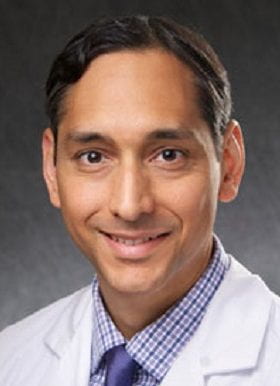
Rajan Sah, MD, PhD
Associate Professor, WashU Medicine
- Phone: 314-273-7748
- Email: rajan.sah@nospam.wustl.edu
Function of novel ion channels as they relate to growth and metabolism
I am a physician-scientist cardiologist in the Department of Internal Medicine at Washington University in St. Louis and Center for Cardiovascular Research. Since starting my independent research program, a major goal of my laboratory is to study the function of novel ion channels; specifically TRP channels (including TRPV3, TRPV4 and TRPM7), and the recently identified volume regulatory anion channel SWELL1 (LRRC8a) as they relate to growth and metabolism. To do this we combine cellular electrophysiology, calcium imaging (GCaMP6) and novel genetic techniques (including transient and stable lenti/AAV-shRNA-mediated knockdown and CRISPRmediated knockout) in cultured cells (mouse and human) and freshly isolated, primary adipocytes, pancreatic β-cells, hepatocytes, skeletal myocytes, and endothelium. Genetic loss-of-function (CRISPR-mediated and conventional) mouse models for these ion channels are also used to examine their functions in vivo and in disease settings. By taking a “wide-angle” view of ion channel signaling in biology, my laboratory has established several new independent research directions (in part through collaborative relationships) that emanates from our findings and leverages unique molecular tools and skill sets established in our laboratory.
A few of these research directions has taken our laboratory into the world of neuroscience as we have initiated projects to understand the function of a newly identified ion channel, SWELL1/LRRC8a in microglia in the brain (in collaboration with Dr. Long-Jun Wu at Mayo Clinic) and in astrocytes in the context of ischemic stroke (in collaboration with Dr. Alexander Mongin at Albany Medical Center). The latter project was recently awarded at R01 (Dr. Mongin, PI). Accordingly, our work is very much in-line with the Mission of the Hope Center in that we are engaged in innovative-disease focused research in neuroscience and we are creating a platform of collaboration across disciplines and institutions to accelerate fundamental discovery and training of the next generation of scientists.